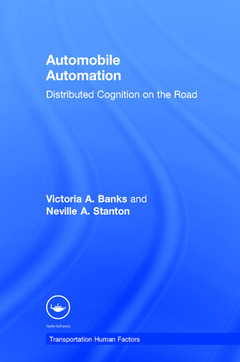Automobile Automation Distributed Cognition on the Road Transportation Human Factors Series
Auteurs : Banks Victoria A., Stanton Neville A.

Increasing levels of driving automation has changed the role of the driver from active operator to passive monitor. However, Systems Design has been plagued by criticism for failing to acknowledge the new role of the driver within the system network. To understand the driver's new role within an automated driving system, the theory of Distributed Cognition is adopted. This approach provides a useful framework for the investigation of allocation of function between multiple agents in the driving system. A Systems Design Framework has been developed that outlines how the Distributed Cognition paradigm can be applied to driving using both qualitative and quantitative research methodologies.
Introduction to Automobile Automation. On the Road to Full Vehicle Automation. Adopting a Systems Engineering View in the Design of Automated Driving Features. Exploring the Use of Verbal Protocol Analysis as a Tool to Analyse Driver Behaviour. Contrasting Models of Driver Behaviour in Emergencies Using Retrospective Verbal Protocols. The Effect of Systems Design on Driver Behaviour: The Case of AEB. What’s Next for Vehicle Automation? From Design Concept through to Prototype. Discovering Driver-Vehicle Coordination Problems in Early Stage System Development. Driver-initiated Design: An Approach to Keeping the Driver in Control? Future Work on Automobile Automation.
Dr. Victoria A Banks is Research Fellow in Human Factors Engineering at the University of Southampton. She was recently awarded her Engineering Doctorate by the University of Southampton in 2016 and also holds a BSc Psychology (Hons) award. Her research interests include modelling, analysing and evaluating the Human Factors implications of increasing levels of autonomy on driver behaviour. She has published over 10 articles related to the field of automobile automation and, in 2014, Dr Banks was invited to speak at the Transport Select Committee Event at Southampton University, from which, she was invited to write an article for ITS International. Dr Banks has previously worked with one of the largest vehicle manufacturers in the UK and was involved with the design and development of future automated technologies.
Professor Neville Stanton, PhD, DSc, is a Chartered Psychologist, Chartered Ergonomist and Chartered Engineer. He holds the Chair in Human Factors Engineering in the Faculty of Engineering and the Environment at the University of Southampton in the UK. He has degrees in Occupational Psychology, Applied Psychology and Human Factors Engineering and has worked at the Universities of Aston, Brunel, Cornell and MIT. His research interests include modelling, predicting, analysing and evaluating human performance in systems as well as designing the interfaces and interaction between humans and technology. Professor Stanton has worked on design of automobiles, aircraft, ships and control rooms over the past 30 years, on a variety of automation projects. He has published 35 books and over 270 journal papers on Ergonomics and Human Factors. In 1998 he was presented with the Institution of Electrical Engineers Divisional Premium Award for research into System Safety. The Institute of Ergonomics and Human Factors in the UK awarded him The Otto Edholm Medal in 2001, The President¹s Medal in 2008 and The Sir Frederic Bartlett Medal in 2012 for his contribution
Date de parution : 08-2017
15.6x23.4 cm
Date de parution : 08-2017
15.6x23.4 cm
Thèmes d’Automobile Automation :
Mots-clés :
Federal Aviation Administration; Driving Simulation; Situation Awareness Global Assessment Technique; Lane Change Systems; Human Automation Performance; Automatic Emergency Braking; Euro NCAP; Operator Event Sequence Diagrams; Autonomous Braking; ADAS; VPA; Advanced Driver Assistant Systems; Systems Design Framework; Neville A; Stanton; Automated Driving System; Network Dynamism; Driver Vehicle Interaction; Transportation Network; Road Transportation Network; Southampton University Driving Simulator; Driver Verbalisations; Multiple System Agents; AEB System; AEB; Driver Commands; Forward Collision Warnings; Information Processing Nodes; Vulnerable Road Users; Pedestrian Detection; Pedestrian Collision; Driver Decision Making; Joint Cognitive System



